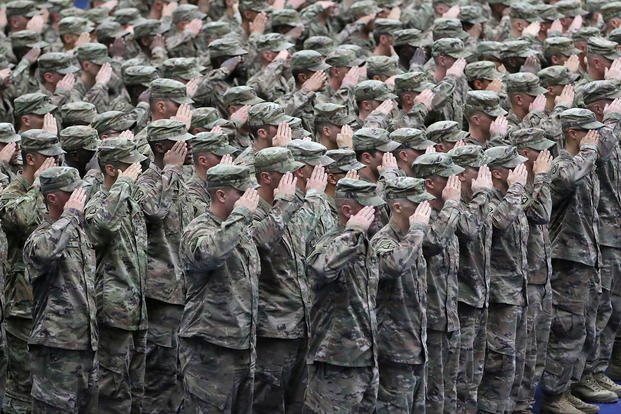The headquarters unit of the Army's 10th Mountain Division will head to Afghanistan in the spring as part of a regular troop rotation, even as the U.S. prepares for a possible major withdrawal of forces, the Army announced this month.
"This historic division continues to be the most deployed in the Army and we are honored to be part of the global coalition in support of Operation Freedom Sentinel," Maj. Gen. Brian Mennes, commander of the 10th Mountain, based at Fort Drum, New York, said in a statement.
The headquarters unit of about 250 soldiers will follow on the arrival of about 3,500 troops from the 10th Mountain's 1st BCT. That unit is expected to move into place in late winter.
In early December, the Army announced that the 1st BCT from the 10th Mountain would be replacing the 3rd Brigade Combat Team of the 82nd Airborne Division.
"We are ready at every echelon to support this mission, and we look forward to working with our international partners to help establish the conditions for long-term stability," Col. James Eldridge, commander of the 1st BCT, said in a statement at the time.
The planned troop rotations are continuing even as the Pentagon considers a major troop withdrawal and the U.S. special envoy for Afghanistan, Zalmay Khalilzad, negotiates for a temporary ceasefire with the Taliban.
Last month, Defense Secretary Mark Esper said the U.S. was looking at a possible drawdown of about 4,000 of the estimated 13,000 troops in Afghanistan "with or without" a political agreement with the Taliban.
Related: Afghan Officials Say Taliban Killed 6 Members of Same Family
In remarks to reporters traveling with him on Dec. 17, Esper said a decision on a withdrawal of about 4,000 troops could be made "in the coming weeks" and had the backing of Army Gen. Austin Scott Miller, commander of U.S. and coalition troops in Afghanistan.
"I would like to go down to a lower number because I want to either bring those troops home [or have them] redeployed to the Indo-Pacific to face off our greatest challenge in terms of the great power competition -- that's vis-a-vis China," Esper said.
Also last month, the State Department announced that Khalilzad was returning to the region to resume talks with the Taliban in Doha, Qatar.
In Davos, Switzerland on Tuesday, President Donald Trump met Prime Minister Imran Khan of Pakistan on a range of issues including Afghanistan and the talks with the Taliban.
"The main issue, of course, is Afghanistan because it concerns the U.S. and Pakistan," Khan said, according to a White House transcript of the meeting. "And, fortunately, we are on the same page. Both of us are interested in peace there and an orderly transition in Afghanistan with talks with the Taliban and the government."
The talks centered on a possible ceasefire of seven to 10 days leading to an overall reduction in violence and an eventual peace settlement. But Kabul government officials have balked at their exclusion from the negotiations, according to reports from Afghanistan's Tolo News.
Last week, John Sopko, head of the office of the Special Inspector General for Afghanistan Reconstruction, warned that the Trump administration should develop an "actionable plan for the day after peace is declared" to avoid the mistakes that have mired the U.S. in more than 18 years of war in Afghanistan.
In testimony to the House Foreign Affairs Committee on Jan. 15, Sopko, who has a record of issuing scathing and pessimistic reports on U.S. efforts in Afghanistan, said the entire U.S. campaign to bring peace and stability to Afghanistan was marred by the "mendacity and hubris" of officials with the U.S. military, State Department and the U.S. Agency for International Development.
"The problem is, there is a disincentive, really, to tell the truth," Sopko said. "We have created an incentive to almost require people to lie."
He also sought to defend his own decision to withhold confidential interviews with senior U.S. officials on the history of policy failures in Afghanistan, some of which contrasted with more optimistic public statements.
The interviews were classified, Sopko said, but they were disclosed by the Washington Post last month after Freedom of Information requests and court challenges and formed the basis for a series titled "At War With The Truth" by Craig Whitlock.
"The documents, and The Post's excellent reporting, helped fill in some significant gaps in our understanding of the U.S. war in Afghanistan," said Rep. Eliot L. Engel, D-New York, the committee's chairman. "It's a damning record."
Sopko said the work of his office has also been hindered by the overclassification of critical data by U.S. officials on matters ranging from the amount of territory controlled by the Taliban to the casualties of the Afghan security forces and the number of children enrolled in school.
"It turns out that everything that is bad news has been classified for the last few years," Sopko said.
-- Richard Sisk can be reached at Richard.Sisk@Military.com.
Read More: Navy Carrier Lincoln Back from Record-Setting 295-Day Deployment












